Text
Hexsquad ESP (Human AU I won't finish cause Im lazy)
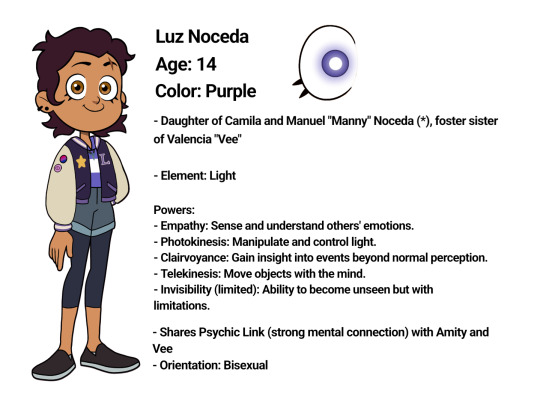
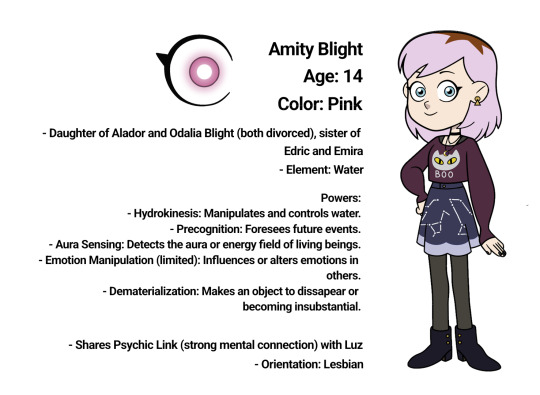



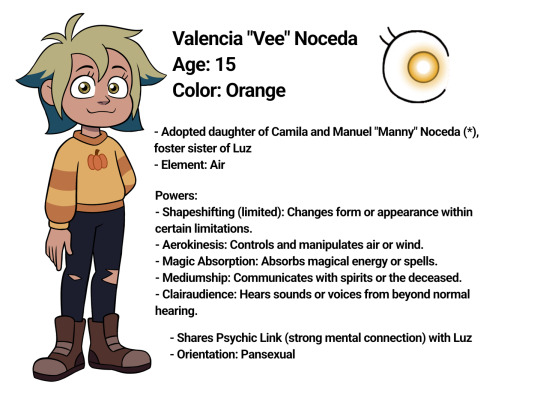
64 notes
·
View notes
Text
Hexsquad ESP (Human AU I won't finish cause Im lazy)






#toh#owl house#the owl house#toh au#owl house au#the owl house au#luz noceda#luz toh#owl house luz#the owl house luz#toh luz#amity blight#amity toh#owl house amity#the owl house amity#toh amity#hunter#hunter toh#owl house hunter#the owl house hunter#toh hunter#willow park#willow toh#owl house willow#the owl house willow#toh willow#gus porter#gus toh#owl house gus#the owl house gus
64 notes
·
View notes
Text
Lumity slight redesign (except of Timeskip Luz)

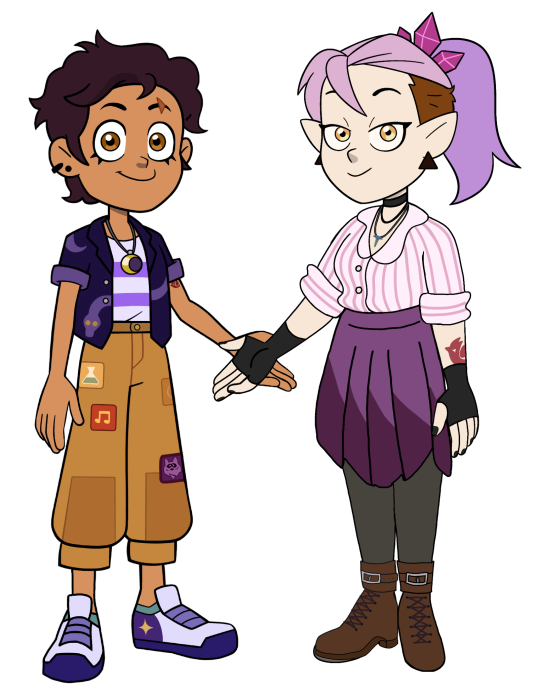
#owl house#the owl house#toh#amity blight#amity toh#owl house amity#the owl house amity#toh amity#luz noceda#owl house luz#the owl house luz#luz toh#toh luz
147 notes
·
View notes
Text
Imagine, Masha having a sixth sense.

#owl house#the owl house#toh#toh masha#the owl house masha#owl house masha#masha toh#masha the owl house#masha owl house
21 notes
·
View notes
Text

Timeskip Amity, but I like to think that canon attire = work attire.
20 notes
·
View notes
Text
In Defence of Watching and Dreaming
Quotes can be found here at the specified timestamps> https://youtu.be/mn4WmyIdsrE
youtube

People often accuse me of hating Watching and Dreaming, but today I’m going to dispel that myth by providing a genuine defence of the episode, focusing only on its positives. Watching and Dreaming is the final episode of The Owl House and is focused on concluding the story in a satisfying way. It provides a well constructed bookend to Luz’s development by showing how she’s grown via contrast to previous episodes. It also does a good job at showing that not everyone can be redeemed, actively making fun of the idea and having Belos die brutally in an excellently pathetic death scene. It also continues the show’s commentary on the chosen one archetype, having Luz receive godlike powers not because she was chosen, but because of the strength of her character. This is achieved through the introduction of Papa Titan, a well executed take on a trope that so often goes awry. The Collector is also redeemed in an incredibly believable way, and the timeskip at the end provides a deservedly happy ending whilst also showing the audience how their favourite characters have grown. As well as this the soundtrack is excellent and the animation is phenomenal – especially in the fight scenes, which are just as well shot and choreographed as the rest of the show’s action. Overall, Watching and Dreaming is a thrilling conclusion to an excellent show.
Okay. Everyone who likes Watching and Dreaming, you can leave now. The essay is over for you, unless you’re curious, that is. Because all of that is how I would attempt to defend Watching and Dreaming. Every aspect I just praised are things I genuinely believe to be strengths of the episode. With some information omitted. Okay, a lot of information omitted. The purpose of this was to establish an understanding, to make it abundantly clear that there are many aspects of the episode that are well constructed. The problem is that this defence heavily relies on the reader not thinking too hard because if they do they’ll realise how much information I omitted and how many things I mentioned were technical aspects. This is essay is The Flaws of Watching and Dreaming. I will only be covering issues within the episode itself and not any issues that stem from previous episodes, because if I were to cover all the problems of Season 3 this essay would be many times longer. The purpose of this essay is not to illustrate why I feel the way I do about the episode, but to provide an argument that challenges the general consensus. The critiques I make are not simply things I didn’t like but things I hope to prove are flaws in the writing with arguments and citations.
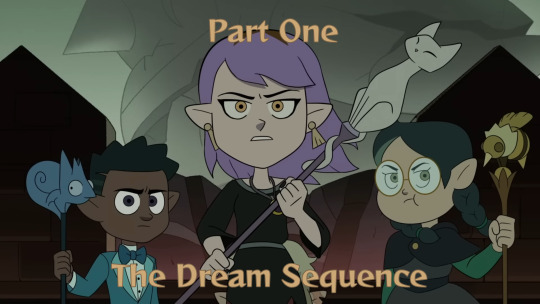
I suppose it makes sense to start at the beginning. Watching and Dreaming opens with what I’m going to call the Dream Sequence. This segment represents many problems that are prevalent throughout the episode, but conceptually it’s pretty interesting: our main trio have been put into a shared dream by the Collector that forces them to relive their greatest fears. Luz’s dream involves her interactions with a mind controlled Hexsquad who are being puppeteered to jab at her deepest fears. Character wise this provides nothing for the Hexsquad since they’re being mind controlled; they don’t mean any of the things they’re saying. Eda and King’s segments serve to reiterate their fears, but this is ultimately pointless as both of them have already had their arcs wrapped up and their fears aren’t relevant to the rest of the episode. The only character aspect that this sequence is relevant to is reminding the audience of Luz’s guilt complex, but the problem with this is that it’s unnecessary; it has been a main focus of the last quarter of the show. It doesn’t even do anything to advance this arc either, simply to remind the audience that it’s there.
Plot wise the only thing this scene serves is the conversation between Belos and the Collector, which could be easily retooled to have the same outcome without this sequence. It’s pointless at worst and extremely wasteful at best. There’s also the logistics of it; Luz can only escape the dream because Amity knows that the light glyph can cancel the Collector’s magic. The audience knows this – it was established in the previous episode – but Amity doesn’t, or more accurately she shouldn’t. The entire plot hinges on Amity having access to a piece of information she simply couldn’t know, and this is a common problem that plagues the episode. It’s also worth noting that this sequence takes up seven minutes of an episode that is already strapped for time. The Dream Sequence adds nothing to the episode and does nothing but waste time, so why does it exist? Well, if you watch the trailer for the episode it’s almost entirely composed of clips from this sequence; it’s trailer bait. However I think it’s most likely that it was an idea the writers had that they couldn’t bear to fully cut, which is a running problem in Season 3.

The final battle is an important aspect of any finale, so how does Watching and Dreaming’s hold up? Like many other aspects of the episode it is flawed. A good example of this is how it starts; Luz breaks into the throne room and immediately runs to Belos’ body. The first problem here is that when Belos first possessed the heart his body got completely covered in a protective coating [0:00] which has since vanished with no explanation. This is significant because Luz would have taken longer to defeat Belos if she had to first break through the coating, which might have given him enough time to stop her. The second problem is the pacing, the battle starts incredibly suddenly with very little buildup. There’s only about thirty seconds between Raine making a joke about Luz’s Titan form and Belos being nearly defeated. This would be a less sudden tonal shift if there was a fight scene in the throne room where Luz had to fight her way to the heart rather than getting to it immediately. It’s very rushed as a climax because it lacks buildup. The counter to this would be to say that the fight scene at the Draining Spell pedestal was the buildup to the final battle, but there is over two minutes between those scenes, including a quiet reunion between lovers which is very clearly a break in the action. The tone shifts very drastically in very little time, going from bombastic action to a warm reunion to climactic and suspenseful all with very little transition time.
The third problem is Belos, namely: what was he hoping to achieve? It seems reasonable to assume that due to how long the Titan has been dead for he’s not able to make it stand up and roll over, so it makes sense that he’d try and raise the arm to slam it down on the Titan’s body. On paper this follows, but in practice less so. If he wanted to slam the arm down then why did he reach all the way up into space? He didn’t need to reach nearly that high to slam it down, so it seems like he’s just being stupid to give the protagonists more time to defeat him. The final problem is also related Belos. When he first possesses the heart it is shown that he only needs a tiny pocket of good to possess it [0:19]. This creates a massive problem for his defeat as there is clearly goo left on the heart after he’s pulled off of it [0:37]. This begs the question: why did yanking him off the heart work? A counter to this is that possessing the Titan took all of Belos’ power, but this still doesn’t justify it. Before Belos possessed the Titan he was unable to keep his goo form but after doing it he was able to recreate his human form, so there’s no reason to believe his power has been diminished. If this is the explanation however, this should be telegraphed to the audience in some way. There’s a difference between the show implying something and the audience writing the story for the show by extrapolating an explanation that isn’t even there.

The episode’s B plot starts with a wonderful piece of contrivance; the Hexsquad puppets were abandoned on a floor that’s dusty enough to draw a glyph on, that’s pretty lucky for them I guess. Amity is also able to move to draw the glyph despite it being previously stated that puppets can’t move of their own volition: ‘You’re not supposed to move on your own, how did you break your spell’ [1:28]. An argument against this could be that Amity was able to move because she got she got freed from the mind control in the dream, but unfortunately her eyes are shown to turn back to their mind controlled appearance once she’s grabbed by the magic tendrils [1:34], so this defence doesn’t hold. The plotline continues by explaining that the witches can’t use their magic due to exhaustion. As much as this seems like an idea that should’ve been introduced earlier it does make sense; the problem comes from the fact that it’s a pointless plot beat. Nothing changes if the witches were able to use their magic to help them free the puppets so why waste screentime introducing a useless element?
Moving on, the end of the plotline is similarly half-baked. The Hexsquad see the Collector helping to keep the Archives together and assume he’s there to help them, which is an attempt to justify them forgiving him later. The problem here is that there is no reason for the Hexsquad to believe that the Collector is helping because he wants to save people; from their perspective it would seem more likely that he doesn’t want his toys to get destroyed. The problem here is similar to Amity somehow knowing to use the light glyph in the dream; we as the audience know that the Collector is only trying to help, but the Hexsquad don’t. They haven’t seen any of his development, they don’t know that he didn’t understand what it means to be mortal. All they know about him is that he caused them to be locked away from their families for months, took over their home, and uses people they care about as toys. Sure they know he’s a child, but that doesn’t justify them just forgiving him immediately. This is fundamentally out of character for all of them. Another issue with this plotline is that it adds very little to the episode. The Hexsquad free a lot of puppets but the Collector frees all of them at the end anyway. No character development is achieved either and it seems like it only exists because the writers knew people would be angry if the Hexsquad didn’t get any focus, so they just threw them in there despite them not really having anything to do. What makes this worse is that the storyboards tell us that Odalia was originally going to be a part of this plotline, which likely would’ve justified its existence if she was utilised to develop the characters in a meaningful way.
This was likely cut for time despite the fact that it has the potential for satisfying character moments, but the Dream Sequence was left in the episode despite having even less relevance. On the note of the Hexsquad it’s a massive issue that Hunter – who was raised and abused by Belos his entire life – doesn’t get a single line acknowledging his death. In fact he doesn’t get a single line acknowledging Belos at all, which is strange because Belos is a massive part of his character so having him not comment on his death is incredibly jarring. The entire plotline is very much a less or more situation. They could’ve done more by developing the plotline further to justify its inclusion, but equally they could’ve cut it entirely and whilst people would’ve been justifiably angry, being able to more effectively utilise that screentime would be an improvement over the shoddy middle ground we received.
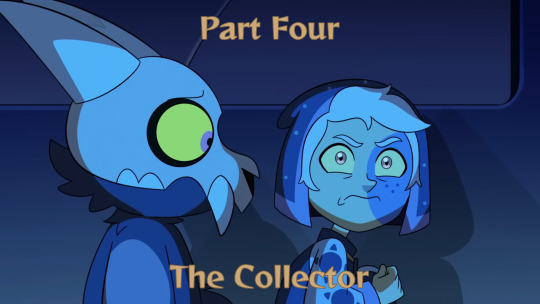
A distinct problem with Watching and Dreaming is how the Collector is handled as he acts very inconsistently with how he did in For the Future. In that episode he was led to believe that King was plotting to kill him:
- ‘The Collector needs to be stopped for good, and I think I know a more permanent solution.’ [1:49]
- ‘Obviously to help King put an end to you and your little games.’ [2:01]
- ‘Luz has come to help King get rid of you for good.’ [2:08]
The line ‘I think I wanna play a new game’ [2:15] combined with his tired, resentful expression tell the audience that Belos’ lies have worked; he’s angry with King and Luz, tired of being betrayed by people he called his friends. The line clearly states that he is done being friendly, but this is walked back on at the start of Watching and Dreaming. When Belos suggests killing the witches, the Collector says ‘I want to be their friends’ [2:23]. This is in absolute opposition to his attitude at the end of the previous episode and it should be plainly obvious why. On top of that, the Collector believing that King was planning to kill him is only referenced one time: ‘King lied, Belos lied, even they lied’ [2:30]. This misunderstanding is never brought up again even after the Collector realises it was Belos all along, despite it being the event that caused him to create the dream world in the first place. Speaking of which, let’s talk about that. Putting the characters into the dream makes sense for the For the Future version of his character; he’s angry and vengeful, it tracks that he would make them relive their worst fears. But because Watching and Dreaming retcons his character, this action makes no sense. Why would he do this if he wanted to befriend them? Even from the point of view of a child that doesn’t make sense. He even says ‘King is gonna hate me for this’ [2:19] despite previously thinking King already hated him. Watching and Dreaming misunderstands the Collector’s development and regresses him back to an earlier point in his arc, causing many of his actions to make no sense.
Another issue in the episode is the Collector’s Warp Star, the flying star that Belos steals to get to the castle. It first appeared in For the Future and is also used by the Collector in the finale to fly to the Archives. He is shown to be able to summon [2:34] and de-summon [2:43] it at will but despite this keeps a spare one in his bedside table. You do have to wonder why he kept a spare if he’s able to summon it on command but at the end of the day he is a child so maybe there’s a little wiggle room when it comes to carelessness. However, the star still presents significant issues in the finale. The question that seems most prescient is how Belos knew the star would be in the bedside cabinet. I think it’s reasonable to assume he looked through the drawers whilst the Collector was setting up the dream but given how significant this is to the episode’s plot it probably should’ve had more of a setup. The more important question is how Belos even knew what the Warp Star did since he wasn’t present at any of the times it was used. It’s not an impossibility that he saw the Collector use the star offscreen but this is so significant to the plot – it’s vital to allow Belos to possess the Titan – that it deserves an explicit setup rather than relying on the audience’s headcanon.

Speaking of Belos, I think it’s time to acknowledge the elephant in the room: no matter how much people say it, he’s not just an evil bad guy who is evil for evil’s sake. He’s an irredeemable monster for sure and fully deserved to die horribly, but one thing he is not is simple. Belos is a pretty complex character, and I cannot stress this enough, complexity does not equal sympathy. The show had been building up his complex characterisation since Hunting Palismen, but it really kicks into gear in Hollow Mind. Starting there, we get the general gist of who Belos truly is; he’s a bigoted witch Hunter who wants to commit genocide because he’s so intrenched in his bigotry that he’s convinced himself that he’s saving humanity. We also get glimpses into his past where he murdered his brother Caleb for betraying the ideals they’d been raised with to be with a witch. A lot of the stuff we learn about Belos in Hollow Mind is quite vague but it works well as a setup. King’s Tide gives a deeper look into his head. He killed Caleb for betraying the ideals they both stood for, and in Belos’ mind he was putting him out of his misery because he believed that the witches had warped Caleb’s sense of reality. This is obviously absurd to any sane person, but the important thing is that this is how Belos thinks of things – even if it is illogical, it’s consistent. We can see this in how he clearly sees Caleb in Luz, stating that he wants to help her – in his own messed up way – and only trying to kill her when he believes she’s been fully corrupted by witches, just like his brother. We can see this when he states ‘I do pity you. These witches have warped your sense of reality, so perhaps it’s best if I put you out of your misery’ [0:48]. All of this happens in just one scene and it is an incredible exploration of his character and how he sees things.
Moving into Season 3, Thanks to Them doesn’t have much for Belos outside of killing Flapjack, who he sees as a symbol of Caleb’s betrayal. Now, I know For the Future is a bit of a wet fart of an episode but the scene between Belos and his hallucinations is actually pretty good. Here we see his cognitive dissonance on full display; he believes killing Caleb was because in his own words ‘I tried to save your soul, it’s your fault this all happened’ [0:57] – this can reasonably be extrapolated to apply to Luz in King’s Tide too. I think it’s safe to say that this should have been the point where the show went in depth on Belos’ backstory, but I don’t think it’s fair to blame Watching and Dreaming for another episode’s mistakes. What I can blame it for is not even alluding to his relationship with Caleb and stripping many of his complexities away. A good example would be that when he kills Luz. There’s no moment where he justifies it or even acknowledges this despite the fact that we know his twisted mind would see killing her as merciful. And say what you want about Belos, but one of his core traits is that he does not change, ever. So what applies in King’s Tide would still apply in the finale. Given that Caleb and Luz were both people he killed to ‘save their souls’ this would have been the prime time to reference his relationship with Caleb. Another example would be during the final battle, he doesn’t have anything interesting to say to Luz aside from the most generic villain dialogue ever. You’d think he’d still be shocked that she’s somehow alive, or that he would try and play mind games with her again, but no. Belos’ past is completely forgotten until the very last scene, his character is absent, replaced by a hollow shell that acts like him on the surface but is missing all the depth and complexity he once had. They decided it was best to turn him into a kaiju instead of utilising his character. Admittedly his death is pretty good – even if I’d have preferred he went out on a more serious note – but it’s built on poor foundations. One good scene can’t redeem an entire episode of wasted potential.
Even his relationship with Luz and how they both saw the Boiling Isles as a fantasy is just brushed off by saying ‘You assume Belos’ goal comes from a genuine place. That man doesn’t care about anything but his need to be the hero in his own delusion’ [1:08], and whilst is true to an extent it’s an idea that warrants more explanation than just a passing acknowledgment. However, note that I said it’s true to an extent. Take the line ‘I just need to live long enough to see this through’ [1:17] in Elsewhere and Elsewhen. This establishes that Belos believed in his goal enough to die for it, implying that becoming the Witch Hunter General and being recognised for ‘saving humanity’ was just an aspirational bonus. This is supported by the fact that he only starts outwardly obsessing about his need to be a hero in King’s Tide, after the Draining Spell has already started and he’s basically already won. Papa Titan’s comment cited earlier ignores this piece of characterisation in favour of supporting the new, simplified Belos. The counter to this would be that Papa Titan was only referring to Belos’ belief that he was doing things for the good of humanity when he said that his beliefs aren’t genuine. This would be true; Belos has simply convinced himself that he’s saving humanity, it’s part of his hero complex. However, this is a singular belief and Papa Titan specifically says beliefs, plural. Maybe it was just a small grammar mistake but given that this character is essentially god and we are supposed to take the things he says to be true, it has wide reaching implications on Belos’ character. Even forgetting all that, to say that Belos only cares about his need to be a hero is just wrong. He is a man fully committed to horrific ideals first and an egotist second. Both are important aspects of his character but neither is the sole motivator for him to do what he did. Watching and Dreaming misunderstands this and makes his ego his sole motive.
With all this established, I’m going to make what will probably be the most controversial statement in this essay: Belos is character assassinated in Watching and Dreaming. This moustache twirling kaiju man is not Belos, he’s a caricature; the character the fanbase thinks he is. The writers did quite a good job with Belos throughout the show, crafting an incredibly complex and compelling yet completely irredeemable antagonist who perfectly juxtaposed the show’s main themes. It’s a real shame they fumbled the bag so hard at the last hurdle as it really harms his character.
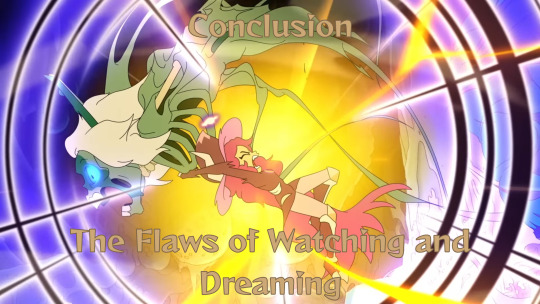
In conclusion, Watching and Dreaming has significant flaws. Characters consistently know information they shouldn’t, both major antagonists act incredibly out of character, the previous episode’s cliffhanger is walked back on, a huge amount of time is wasted, the plot is resolved in a nonsensical fashion and the final battle has many issues. As I stated at the beginning, the episode also has many positive aspects.
People often accuse me of hating Watching and Dreaming. I think it’s more accurate to say that I mourn Watching and Dreaming.
44 notes
·
View notes